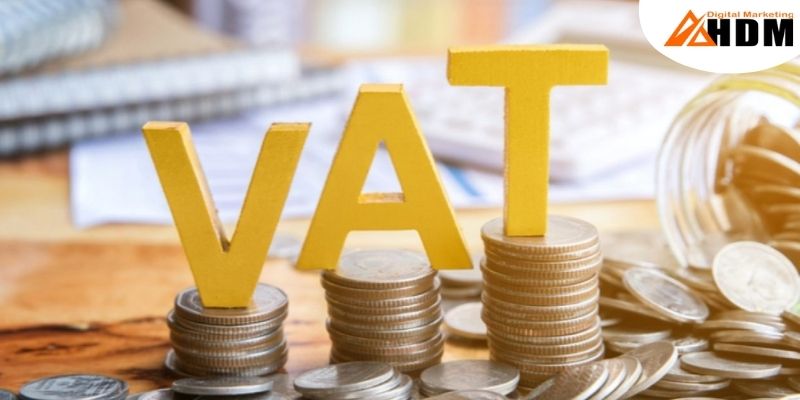You may have heard the term VAT, which you want to know to learn your business accounting services and keep your book records clean.
Many things in accounting and taxation sound too financial and difficult to understand in the first place, but with your little time and effort, you can easily understand all of these things.
It is known that tax services are challenging and difficult to understand, but they may help you to understand your business and run it smoothly.
You may have a question regarding Do I need to register for VAT? As starting your small business. Well, here are some things every small business must know about VAT, which helps them understand a little bit about their taxation process in accounting. know about vat
What is VAT?
Full-Form: Value Added Tax
VAT is a general tax term that applies to almost every goods and product.
The fundamental premise of VAT is that taxes should indeed be dependent on the value of the assets that customers purchase.
The average rate of VAT in the United Kingdom is presently 20%, and this is the amount payable on the majority of purchases. There are, however, different VAT rates that you should be aware of as a business. VAT is levied at a reduced rate of 5% for sanitary goods, energy-saving solutions, and children’s car seats. know about vat
Most food, books, newspapers, and children’s clothing are subject to zero rates, which is charged at 0%. Despite the fact that no VAT is levied, the sale of zero-rate goods and services must still be documented and reported on your VAT return.
Furthermore, certain products are deemed “exempt.” Postage stamps, as well as financial and real estate transactions, fall within this category. These products and services, like zero-rate items, are exempt from VAT. These, however, are not required to be included in your taxable turnover.
The tax you impose on those services is your output tax for Tax reasons. VAT registered consumers who use your supplies for their organization must register the tax you invoice them as their tax payable.
The VAT you paid to your suppliers for sales and purchases, and expenditures are referred to as input tax. VAT on basic materials and items purchased for resale, as well as company equipment, business telephone conversations, and payments for professional services such as accountants’ fees, are all included. know about vat
VAT CHARGES PERCENTAGE:
| YEAR | RATE OF VAT |
| 1973-74 | 10% |
| 1974-79 | 8% |
| 1979-91 | 15% |
| 1991-2008 | 17.5% |
| 2008-09 | 15% |
| 2009-11 | 17.5% |
| 2011-at present | 20% |
Read More:-
- 11 Step, How To Make Business Introduction video?
- 5 Steps To Build An Effective CRM Strategy For Business
- Is Digital Marketing Important?
- Top Digital Marketing Tools
Ten Things That Every Small business owners should know about VAT:
- Getting in touch
- Registration for VAT
- Your company’s VAT strategy should be correct
- Impact on customers
- Book Keeping
- Keeping your VAT safe
- VAT Online
- Direct Debit
- VAT Penalties
- If in Doubt
1. Getting in touch:
HMRC’s VAT Helpline: 0300 200 37000
The VAT helpdesk at HMRC can be reached at 0300 200 37000. (8 am to 6 pm). Alternatively, you can find various ways to contact them here, including the ability to use a Webchat, which I’ve found to be a great alternative at BytesStart. know about vat
2. Registration for VAT:
Register: https://www.gov.uk/vat-registration
When your company needs to register for VAT, you should be informed of it. If your turnover exceeds £85,000 in a 12-month period (the tax year 2021/22), you must register. If your annual income does not reach this figure, you are not needed to register.
3. Your company’s VAT strategy should be correct:
Joining the Flat Rate Scheme may be beneficial to you, which was created to simplify VAT accounting for small enterprises, in addition to the conventional VAT scheme. During the first year after enrolling, you will receive a 1% discount on your flat cost.
Cash accounting (in which you only pay back VAT to HMRC once your clients have paid you) and the annual accounting scheme are two more sorts of schemes.
4. Impact on Clients:
Once you’ve registered for VAT, you must include VAT in pricing any items or services you supply. This will influence your pricing and any non-VAT registered clients you may have, as they will not be able to refund the VAT cost. Of course, if your yearly income is smaller than the current registration threshold, this is simply a consideration.
5. Book Keeping(Keep Accurate Records:
You must keep correct and up-to-date VAT records so that you can simply complete your VAT returns. Documents like receipts, invoices, and other paperwork should be kept in one convenient location.
Keep accurate records in your books, keep everything clean and in order, manage the timeline, and give your 100% saving your records and books.
Hiring a good accountant for your business may solve all of your issues to keep accurate records and your books in order well organized and functioned.
6. Keeping your VAT Safe:
Put any VAT liabilities that you collect for HMRC in a separate account from any other tax you might owe (such as Corporation Tax if you run a limited company).
Don’t spend money that isn’t yours in any way. With cloud accounting software becoming universal these days, you have no excuse if you take more money out of your firm than you should.
We recommend that you form a separate deposit bank account into which you can deposit any future tax liabilities regularly. You are unlikely to receive any income on your money these days, unfortunately!
7. VAT online:
pay your VAT online: https://www.gov.uk/pay-vat
Almost all businesses now file their tax returns online. In fact, you can connect your Government Gateway VAT account and file your quarterly reports from within online accounting software like Sage, Xero, or FreeAgent.
Before paying your value-added tax, ensure that your deadline isn’t passed. In the VAT return, you can find your due date.
You may face the consequences and penalties if your payment amount wouldn’t reach HMRC’s account before the deadline.
8. Direct Debit:
VAT liabilities made electronically since 2012 you can set up a direct debit with her majesty’s revenue and custom. This process scheme will automatically deduct whatever you owe or purchase from your business account. You would also get extra spare seven days in comparison to other businesses that don’t use direct debit.
9. VAT Penalties:
Avoid being late on your VAT returns and payments. However, there is no ‘surcharge’ for the first late submission, the percentage imposed on any VAT liability you owe increases as the number of times you have paid late increases. It simply isn’t worth the bother.
Your timeliness and accuracy are important for your business accounts.
More details about VAT charges can be found here.
https://www.gov.uk/vat-returns/surcharges-and-penalties
10. If in Doubt:
If in doubt you can visit HMRC and www.gov.uk to find out more about VAT services and taxation process for your small business if needed. However, the best advice is to hire an accountant or an accounting service that may help you to discover and learn about the VAT taxation Process deeply.




